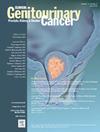Comparison of Outcomes Between African American and European American Patients With Metastatic Clear Cell Renal Cell Carcinoma Receiving Immune Checkpoint Inhibitors
IF 2.3
3区 医学
Q3 ONCOLOGY
引用次数: 0
Abstract
Background and Objective
Immune checkpoint inhibitors (ICIs) and ICI/tyrosine kinase inhibitor (TKI) (ICI-based) combinations are standard first-line treatment (tx) options for patients with metastatic clear cell renal cell carcinoma (mRCC). However, only 1% of patients enrolled in trials studying these agents were Blacks.
Methods
Patients with mRCC who received front-line ICI-based tx or sunitinib after 2011 were included from the Flatiron Health electronic record-derived database. We analyzed progression-free survival in African American (Black) and European American (White) patients and tested the interaction between treatment type and race. Multivariable Cox proportional hazards models were used to assess associations with outcomes.
Key Findings and Limitations
Of 2,592 eligible pts, 2,379 (91.8%) were White, and 213 (8.2%) were Black. Of these, 1453 (56%) received ICI-based tx and 1139 (44%) received sunitinib. IMDC favorable, intermediate/poor and unknown risk was noted among 6%, 77.5% and 16.4% of White patients and 3.3%, 86.8% and 9.9% of Black patients. Median age was 64 years. There was no significant difference in PFS between Black and White patients receiving ICI-based treatment compared to sunitinib [hazard ratio (HR) for interaction between treatment type and race was 1.063 (0.78-1.45, P = .7)]. The interaction term between race and treatment type showed that there was no evidence of a differential treatment effect by race in the first 10 months (HR = 0.931 (0.79-1.10); P = .40), however significantly improved after 10 months (HR = 0.697 (0.56-0.87); P = .001). The retrospective nature of the study is a limitation
Conclusions and Clinical Implications
The study found no significant difference in treatment effects between White and Black patients receiving ICI-based first-line treatment and should be the standard of care for both Black and White patients.
Patient Summary
We reviewed Flatiron databases of patients with mRCC from both Black and White populations, finding that ICI-based therapy should be considered the standard of care for patients from both racial backgrounds.
求助全文
约1分钟内获得全文
求助全文
来源期刊

Clinical genitourinary cancer
医学-泌尿学与肾脏学
CiteScore
5.20
自引率
6.20%
发文量
201
审稿时长
54 days
期刊介绍:
Clinical Genitourinary Cancer is a peer-reviewed journal that publishes original articles describing various aspects of clinical and translational research in genitourinary cancers. Clinical Genitourinary Cancer is devoted to articles on detection, diagnosis, prevention, and treatment of genitourinary cancers. The main emphasis is on recent scientific developments in all areas related to genitourinary malignancies. Specific areas of interest include clinical research and mechanistic approaches; drug sensitivity and resistance; gene and antisense therapy; pathology, markers, and prognostic indicators; chemoprevention strategies; multimodality therapy; and integration of various approaches.
 求助内容:
求助内容: 应助结果提醒方式:
应助结果提醒方式:


